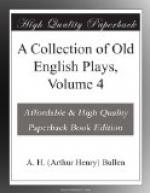[207] Old ed. “warre.”
[208] Old ed. “free.”
[209] Old ed. “And.”
[210] Old ed. “Then.”
[211] See remarks in the Introduction.
[212] Old ed. “a jemme.”
[213] Quy. “creep” (for the sake of the rhyme)?
[214] Gondola.
[215] Old ed. “recover’d.”
[216] “Timelesse lives taken away” = lives cut short by an untimely stroke.
[217] Old ed. “prisoned.”
[218] Old ed. “playes.”
[219] In As You Like It, Rosalind, speaking the Epilogue, justifies the novelty of the proceeding:—“It is not the fashion to see the lady the epilogue; but it is no more unhandsome than to see the lord the prologue.”—Flavia is the earliest example, so far as I know, of a lady-prologue.
[220] Old ed. “Endeauours.”
[221] Old ed. “smile.” The emendation was suggested to me by Mr. Fleay.
[222] The old ed. gives “they are monsters Graccus, they call them,” assigning Graccus’ speech to Acutus.
[223] Old ed. “Of.”
[224] The old form of bankrupt.
[225] Canaries was the name of a lively dance.
[226] A skeleton. Perhaps we should read “an atomy.”
[227] Not marked in old ed.
[228] Not marked in old ed.
[229] Old ed. “Sernulas.”
[230] Old ed. “Srnu.”
[231] Old ed. “Here’s none but only I, sing.” I take the word sing to be a stage-direction, and the preceding words to be part of a song.
[232] “More hayre than wit”—a proverbial expression. Ray gives the proverb, “Bush natural, more hair than wit.”
[233] Old ed. “Least.”
[234] Old ed. “Phy.” Scilicet is offering a second ducket to his instructor.
[235] The rest of the speech is given to “Seru.” in the old ed.
[236] A sweet Spanish wine.
[237] Not marked in old ed.
[238] See note [63] in vol. II.
[239] Old ed. “suret.”
[240] An allusion to the religious sect called The Family of Love.
[241] Not marked in old ed.
[242] Not marked in old ed.
[243] The old ed. gives “burbarrels.” The allusion is to the bum-rolls,—stuffed cushions worn by women to make their petticoats swell out. Cf. Stephen Gosson’s Pleasant Quippes—
“If barreld bums
were full of ale,
They well might serve Tom
Tapsters turne.”
[244] Old ed. “women.”
[245] Not marked in old ed.
[246] Breeches that came below the garters.
[247] I am unable to mend this passage.
[248] Old ed. “looke.”—Perhaps we should read “With him—ah, looke! looke!—the bright,” &c.
[249] Old ed. “if they twang.”
[250] Not marked in old ed.
[251] This is Mr. Fleay’s correction for old ed.’s “Conceale.”




